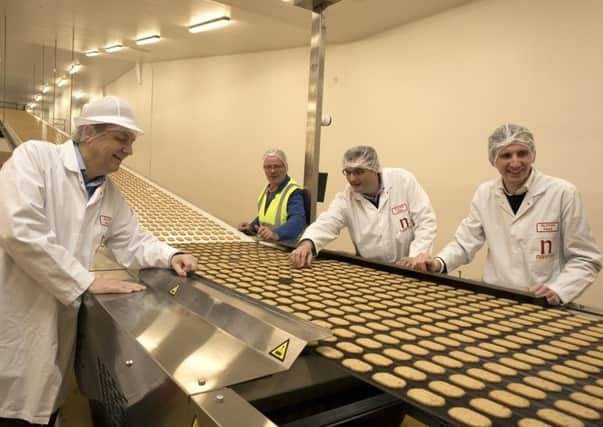Scottish staple Nairn's looking to sow more oats
This article contains affiliate links. We may earn a small commission on items purchased through this article, but that does not affect our editorial judgement.


More than 120 years later, it has grown from cottage industry to large-scale production, with about 150 staff and on track to generate turnover in excess of £27 million in its financial year ending on Wednesday.
• READ MORE: Oatcake firm invests £6m in new gluten-free site
Advertisement
Hide AdAdvertisement
Hide AdBut customer appetites, health trends and macroeconomic conditions have evolved considerably since its debut, and the firm is determined to alter its operations to keep pace, according to managing director Martyn Gray.
He has seen that as the business has grown, “we’ve had to look at specialists in each department, because it’s not just a small family business now — we are a good medium-sized business that needs to adapt to the markets that we’re now in”.
In addition to its core oatcakes and biscuits, the firm also sells products under the Simmers header, including Abernethy and Butter Biscuits, with an additional gluten-free range providing a key growth driver.
Nairn’s, which has remained in private ownership after a buy-out from United Biscuits in 1996, said about a year ago that it was investing £6m in its gluten-free manufacturing operation at a new site after the existing one proved unable to meet growing demand.
However, with manufacturing becoming increasingly automated, the move saw a notable reduction in both permanent and temporary staff. Nairn’s, based in Peffermill Road, has become the UK’s second-largest gluten-free producer according to Mintel, having entered the sector in 2010 from what Gray calls a “standing start”, and in addition to being the UK’s top oatcake producer.
When the new gluten-free facility was announced, he said it was to meet demand and “bring a pipeline of new products currently in development to market. In turn, this will protect and enhance the sustainability of the entire business.”
Nairn’s also said the UK gluten-free market was worth nearly £500 million and was expected to see growth of more than 40 per cent in coming years.
Advertisement
Hide AdAdvertisement
Hide AdBut Gray, who joined the firm in 2010 from the beer trade, initially as marketing director, admits that such expansion is a double-edged sword, offering both the chance to accelerate revenues but with other players keen to take a cut themselves.
“The market is very, very competitive,” he says, but sees its long-term viability as highly positive. “All the projections are that it will continue to grow at double-digits over the next few years.”
Key factors in such expansion are increasing diagnoses of Coeliac disease, and growth in wheat intolerances.
Nairn’s is now set to generate revenues of about £9m this year from its gluten-free operations, helped by developing its product range, says Gray. And the firm is considering “what is the next product in the areas that we should be developing, and I think the growth of gluten-free has given us a licence to think slightly ‘outside the dots’ in terms of where we go next”.
But as is now standard for many consumer-oriented businesses, the outlook is complex, with consumer purse strings tightening this year as inflation overtakes wage growth. Gray expects a “small, steady” jump in food inflation over the next six months, with Nairn’s seeing a rising cost of imported goods, although it buys most of its products from the UK, “so we don’t have that currency risk that maybe some firms have”. The “huge uncertainty” of Brexit is an additional headache, in Gray’s view, and its workforce includes staff from Poland, Romania and Spain.
“We export, like many companies, and we have to be cognisant of how that would affect any deals we’re currently doing, and any trade agreements we’re currently involved with in different [global] markets.” But export, already covering 30 markets, is a key priority, says Gray. “I feel as though there are a plenty of opportunities worldwide — it’s just about having the right focus in the markets where we think we can make the biggest change.”
He sees opportunities to leverage its progress in the likes of North America, Australasia, South Africa, Cyprus and the Middle East, but is also looking at Europe.
Advertisement
Hide AdAdvertisement
Hide AdAdditionally, Gray sees the core business as remaining resilient, but would like to see it grow, boosted by greater take-up in the UK of oatcakes, which he says are currently bought by only nine in 100 households.
The MD is also a finalist in the EY Entrepreneur Of The Year Scotland 2017, but says his priority is the business’ progress. “The more we grow, job security increases, everybody’s profit share increases as well. I think all those things matter when you’re a local business, you’ve got 150 people coming to work every day and you’re responsible for them.”